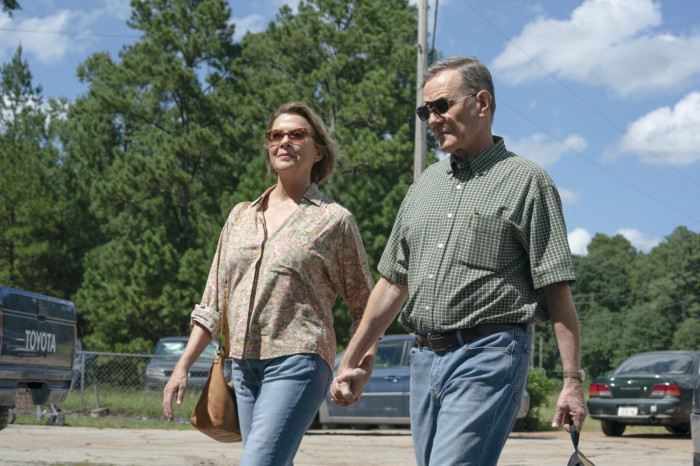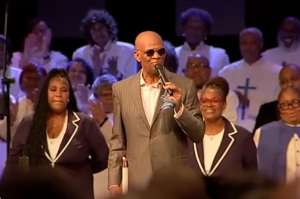'Jerry and Marge Go Large' tells uplifting true story of couple who legally cracks lottery, transform small town

At a time when dark content is pervasive across Hollywood, the film “Jerry and Marge Go Large,” starring Bryan Cranston and Annette Bening, assures audiences that there's still good in the world — and generosity has far-reaching effects.
The feature-length comedy is based on the true story of Gerald Selbee, a resident of the small town of Evart, Michigan, who figured out a way to legally hack the lottery.
The year was 2003, and Selbee, a retiree, figured out a mathematical loophole in the since-discontinued lottery game Winfall. Along with his wife, Marjorie, family and friends, Selbee would go on to win nearly $27 million over a nine-year period.
But instead of investing the money in expensive cars, boats or other material goods, the Selbees, high school sweethearts and parents of six, remained in the same modest home and used their winnings to give back to their community, revive their economically ailing town and help their grandchildren and great-grandchildren pay for their educations.
Now, nearly a decade later, their story is hitting the big screen, premiering on Paramount+ on June 17. In an interview with The Christian Post, Bening, an award-winning actress, described the Selbees as “fabulous” and “honest” people. To get into character, she and Cranston got to know the couple, who are now in their 80s.
“It was enjoyable to play a happily married couple,” she said. “And the fact that Jerry figured out the flaw in the lottery, it's important to remember that; that they didn't cheat. It wasn't like they had a scam going, they figured out a flaw.”
The Selbees would drive from Michigan to Massachusets every three weeks, buying tickets and counting them together. Once they’d receive a check, they’d share their winnings with family and friends, many of whom joined them in playing the lottery. These friends included Selbee’s accountant, played by Larry Wilmore, and a clerk at the convenience store where they bought the lottery tickets, played by Rainn Wilson ("The Office").
Interestingly, the Massachusetts State Lottery was aware of what the Selbees and their friends were doing — yet didn’t find their actions problematic.
“They had a lot of fun,” Bening said. “I'm sure like any married couple, they've been through a lot. They raised six kids, but they were a team for sure. And you know, they both have a real twinkle for each other. It's very sweet.”
“I just love that about doing the film; that it's really about a healthy relationship,” she added. “Good, honest people who happen to get on to this thing, and make a lot of money; didn't change them didn't really change their lives and the way they live their lives. They're wonderful people.”
“Jerry and Marge Go Large” also follows how the Selbees faced competition from sleazy MIT students, forcing Jerry to re-think his strategies. But for Jerry, a former employee of Kellogg’s cereal factory, hacking the lottery wasn’t necessarily about winning money; it was a hobby that gave him both a sense of purpose and an opportunity to give back to those he loved most.
Cranston, best known for his Emmy Award-winning role as "Breaking Bad" antihero Walter White, shared that Jerry was the first role he tackled since coming out of the COVID-19 lockdowns.
“We were coming out of COVID and everyone feeling restricted and being sequestered in our lives, and society was kind of feeling tight. And I wanted to open that up, I wanted to feel better. I wanted to feel more free. And I think this movie does that. … I just wanted to feel a sense of community in making it and also in the story itself. Jerry and Marge really did it for us.”
Cranston said he’s always attracted to “complex,” often dysfunctional characters. But stepping into the uplifting shoes of Jerry Selbee “was a different thing.”
“If everyone functions very well, it doesn't make for a very good story,” he said. “We want to see people overcoming their shortcomings; we want to see people achieving something that they even didn't feel they could themselves.”
“Jerry was a different thing,” the 66-year-old actor said. “It was a different feeling to take on this character because it didn't have a lot of internal conflict. We kind of took the artistic liberty just to suggest that he might be a little socially ungraceful and that he's never been comfortable in figuring out people; he's good with math, and that kind of helped and worked toward the overall foundation of the film. But in real life, Jerry is actually a fun-loving kind of guy. He's gregarious, and he'll talk all day long.”
Directed by David Frankel ("The Devil Wears Prada," "Marley & Me"), “Jerry and Marge Go Large” is rated PG-13 for some language and suggestive references. Though it’s not a faith-based film, it’s the kind of feel-good movie that brings to light the stories that often go untold, reminding viewers of the importance of community and power of generosity.
“To find something that is a feel-good story that is based on something true, that was just for me, a real delight,” Bening said. “I feel really lucky. My parents can watch this movie. It was a real privilege to get to do that.”
Leah M. Klett is a reporter for The Christian Post. She can be reached at: leah.klett@christianpost.com




























